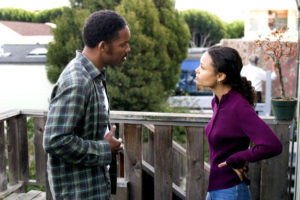Rising against all odds movies are typically reserved for sports films. “Cinderella Man,” “Rocky.” We understand their struggle, and something about the high risk/reward payoff at these films’ conclusions make the struggle all the more real. But sometimes it takes a film about not an athlete, but an ordinary man trying to survive to have these revelations truly hit home. Gabriele Muccino’s “The Pursuit of Happyness” is such a film. With a realistic and focused aim, and a terrific acting performance by Will Smith, the film was nominated for an Oscar and remains one of the most inspirational films to come out of 2006.
When we meet Will Smith’s character, Chris Gardner, he’s on the bottom rung. He’s a salesman, struggling to sell his supply of a new type of bone density scanner to doctor’s offices. By his own admission, he hasn’t sold one for a while. He and his wife (Thandie Newton) are barely making ends meet, barely making rent, his wife working double shifts at a factory while Chris pounds the pavement. It isn’t long before things fall apart; Linda leaves to find better work in New York with a friend. Chris takes custody of his young son (played by Smith’s real-life son Jaden Smith), and signs up for an internship with a brokerage firm in hopes of making it out of his poverty woes and starting a good life for he and his son.
The film is quick to show the ties that bind Chris and his son together, as well as the stark walls between those fortunate and those less so. The film takes place in San Fransisco, and shots of trolly rides are interspersed with men and women in business suits stepping over homeless people, the societal walls between them thicker than physical ones. Cinematically, the film paints San Fransisco in a bright light, full of possibilities. Chris hears about an internship at a company called Dean Witter after bumping into a stockbroker stepping out of a fancy car. “I have two questions for you,” Chris gasps in awe. “What do you do and how do you do it??”

As morose as it may sound, where “The Pursuit of Happyness” excels is in its portrayal of the grim circumstances that Chris finds himself in throughout. The internship has no salary. He has a son to care for. He’s forced, during the course of the movie, to experience true hunger, desperation, homelessness. He begs a friend for $14 dollars that he owes him; only to a man like Chris – and one played so expertly by Will Smith – do we know how much that $14 means to him. And, in the film’s most desperate sequence, Chris and his son must spend the night in a locked bathroom. A man knocks to get in. And knocks. And knocks. Chris’ silent tears put more heart into his character, and into this movie, than a million impassioned speeches ever could.
The movie hosts a bevy of well-intentioned and likable characters. There’s Jay Twistle (played by Brian Howe) who gives Chris the internship opportunity, impressed by Chris, who’s able to complete the seemingly impossible Rubik’s cube (the film is set in the ‘80s, with several TV appearances by then-President Ronald Reagan). There’s also Kurt Fuller, playing a billionaire named Walter Ribbon, whom Chris tries to cozy up to to gain sales for his brokerage firm, and James Karen, playing a Dean Witter executive named Martin Frohm. Two hippies who follow Chris through the movie (one who seems fixated on the fact that Chris’ bone density scanner is a ‘time machine’) also add to the film in comical ways, but the movie avoids the temptation to poke fun at their situation, instead using it for fodder for Chris to bond with his son later.
All in all, “The Pursuit of Happyness” is a solid film, one that will make you feel warm and pained throughout. While not as renowned a film from Smith as “Ali,” this is one you shouldn’t miss nonetheless.
– by Mark Ziobro